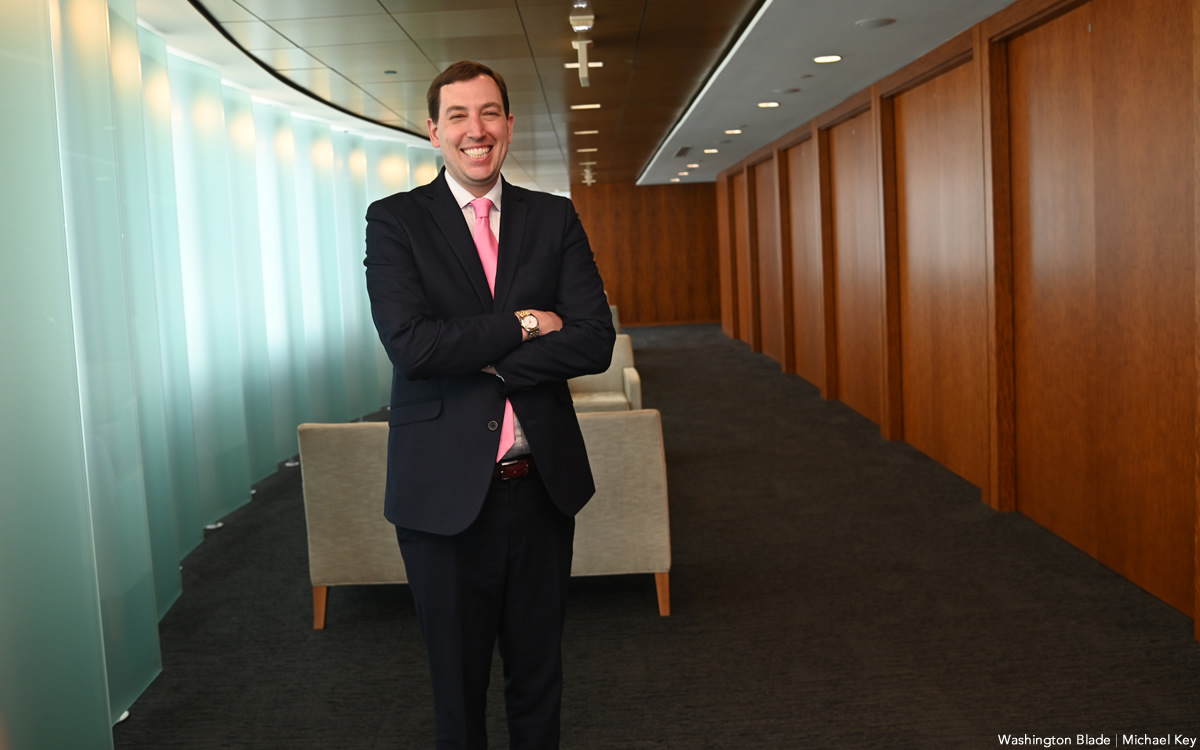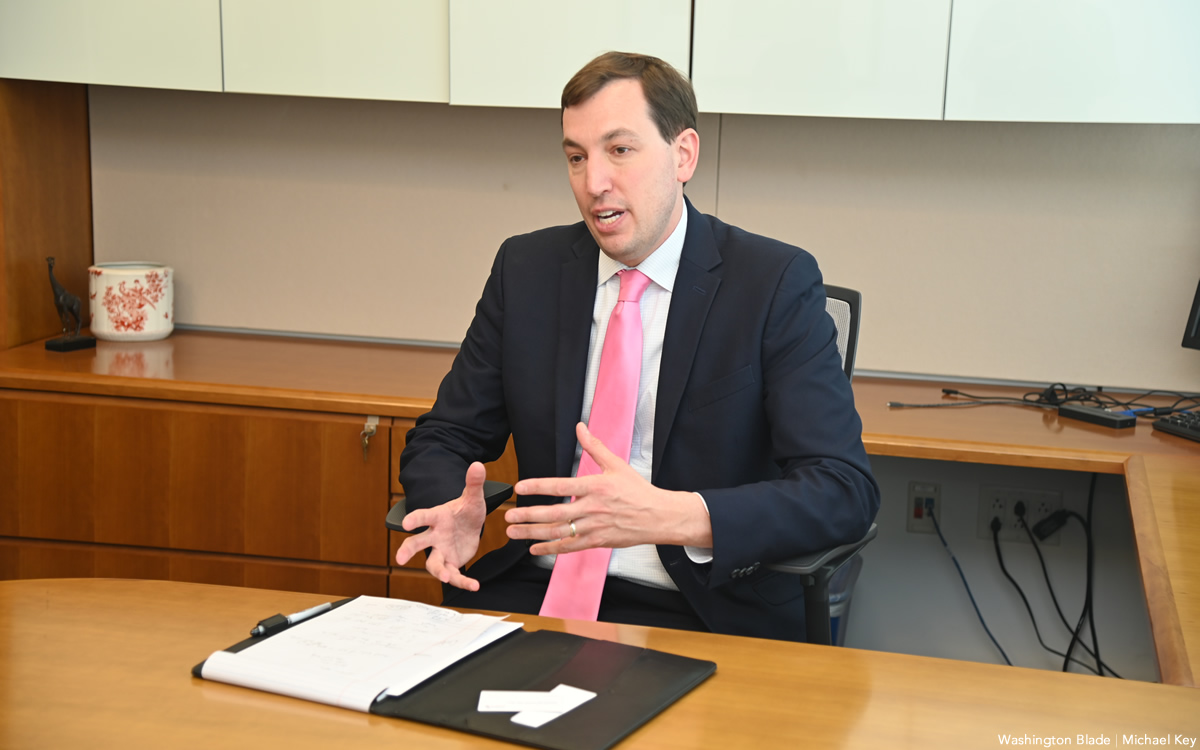Health
Incoming AMA president: ‘We simply will not stand’ for anti-trans healthcare restrictions
Org will use ‘every avenue available’ to push back

Doctor Jesse Ehrenfeld sat down with the Washington Blade on Tuesday, weeks ahead of the start of his tenure as the American Medical Association’s first openly gay president and amid an onslaught of legislative attacks targeting trans Americans’ access to healthcare.
“We see the attack on reproductive care, reproductive access, and transgender healthcare as a continuum of government overreach into patient-physician decision making,” Ehrenfeld said.
“We simply will not stand for the government coming in to interfere with the doctor-patient relationship,” such as by passing these laws that “outlaw what we know to be appropriate, evidence-based clinical guidelines-based care,” he said.
An anesthesiologist who served as the Joseph A. Johnson Jr. Distinguished Leadership Professor of anesthesiology, surgery, biomedical informatics & health policy at Vanderbilt University’s School of Medicine, much of Ehrenfeld’s professional background has been focused on matters of healthcare access, particularly for LGBTQ patients.
Ehrenfeld directs a $560 million philanthropic organization, Advancing a Healthier Wisconsin Endowment, while also serving as a consultant for the World Health Organization’s Digital Health Technical Advisory Group. He was special adviser to former U.S. Surgeon General Jerome Adams, who served during the Trump administration.
For his research on “understanding how can we use technology to work better for LGBTQ people,” in 2018 Ehrenfeld became the inaugural recipient of the NIH’s Sexual and Gender Minority Research Investigator Award.
He and his team did much of the work for that project at Vanderbilt’s Program for LGBTQ Health, which he co-founded and led for several years “before I took on my current clinical role in Wisconsin.”
“At the end of the day,” Ehrenfeld said, “we’re really about improving access to health care for LGBTQ people, which is a lot of the work that I have been involved in at the AMA and is a core piece of what we’re trying to do nationally through our policy activities.”
In testimony before the U.S. House Armed Services Committee in 2019, Ehrenfeld told lawmakers: “I would like to state unequivocally that there is no medically valid reason—including a diagnosis of gender dysphoria—to exclude transgender individuals from military service.”
Last year, far-right anti-trans pundit Matt Walsh targeted Vanderbilt’s Transgender Health Clinic on his podcast, leading conservative lawmakers in Tennessee to call for investigations of the institution based on information the university claims was “misrepresented” or taken out of context.
“It’s deeply personal for me,” Ehrenfeld said. “Almost everybody that I helped recruit and hire at Vanderbilt, their personal information was shared online. Their names were on TV. And that has had a chilling effect [both] there and in many places across the country, as there have been attempts to intimidate and threaten practitioners who are providing what we know is evidence based appropriate care.”
A big moment for Ehrenfeld and the AMA
Ehrenfeld will be inaugurated as AMA president on June 13, midway through Pride month. It will be an exciting time, he said. “The AMA will have our first contingent walking in the Chicago Pride Parade…so, my husband and the family and the kids will all be there with a bunch of AMA colleagues celebrating at the end of June.”
“It’s an exciting moment for the organization, but I think also for the community for a bunch of reasons,” Ehrenfeld said. “One is, you know, to be an out person in a very visible role, I think sends a message to patients in the community as well as LGBTQ physicians and other healthcare workers, that their needs are being heard in a way that hasn’t always happened,” notwithstanding “challenges that are happening in many places on the legislative level.”
On a personal level, he said, “growing up, I didn’t have a lot of LGBTQ role models in college and medical school who I saw as defining a career pathway for me.” This meant “I would often question, ‘would I have a role? Was there a place for me as an out person in medicine, in leadership, doing policy work, trying to make the community healthier and improve access to health care?'”
Ehrenfeld said his leadership of the AMA marks an “important moment” in the organization’s history, demonstrating what is now possible for LGBTQ people who historically were denied these types of opportunities.

Anti-trans laws worsen systemic issues in healthcare
“The AMA opposes any policy “that creates a barrier between a patient and their doctor making a decision that’s in the patient’s best interests,” Ehrenfeld said, which includes “efforts to ban care for transgender people” at the state and federal level. “We stand for the science, the evidence, [and] the clinical guidelines that we know lead to better outcomes for patients.”
Even beyond healthcare restrictions that are passed legislatively, “we have a lot of backseat drivers trying to tell doctors what to do,” Ehrenfeld said, like “insurance companies who put up barriers around prior authorization for getting approval for care and services.”
“Those things are real and they cause people to give up trying to get the care they need,” he said.
Six states have passed laws criminalizing certain healthcare interventions for the treatment of gender dysphoria, which carry the specter of felony charges for healthcare providers. These, Ehrenfeld said, are the most “heartbreaking” for him personally.
Survey data says one in five physicians is experiencing signs of burnout, with an increase beginning with the COVID-19 pandemic, Ehrenfeld said. “That burnout is only exacerbated when you find yourself practicing in a place where a law is passed that tells you how to practice or [tells you] that you can’t practice.”
“That causes moral injury to a physician who finds an untenable choice: provide the care that they know is in the patient’s best interests, or break the law and [potentially] go to jail,” Ehrenfeld said. “And that stress is real. There’s not a week that goes by that I don’t hear from a colleague who says I can’t take it anymore.”
Beyond impacts felt by individual healthcare workers, “we’ve seen a drop in the number of physicians who are applying for training positions in states where care is being restricted,” he said. “When, suddenly, you don’t have specialists and internists and primary care providers working in a state, that impacts care for everybody.”
Anti-trans legislative restrictions on healthcare are increasingly targeting adults, too. Florida’s S.B. 254, which would allow the state to take children away from parents who facilitate their access to best-practices treatments for gender dysphoria, would also bar all Floridians from accessing gender affirming care via telehealth, or that which is administered by nurse practitioners and physicians’ assistants.
“Telehealth is particularly important for a lot of LGBTQ people because of access distance challenges and the need to seek care in places that often is not immediately local,” Ehrenfeld said.
“There’s this cascading effect of, unfortunately reducing access to care that’s very concerning to me and to the AMA,” he said.
When laws proscribe healthcare interventions that “we know to be appropriate,” Ehrenfeld said, “we use every avenue available” – from pressuring the National Governors Association to filing lawsuits and amicus briefs in coordination with other stakeholders as well as “work on the policy side at the federal level and with our state partners.”
Monkeypox
US contributes more than $90 million to fight mpox outbreak in Africa
WHO and Africa CDC has declared a public health emergency

The U.S. has contributed more than $90 million to the fight against the mpox outbreak in Africa.
The U.S. Agency for International Development on Tuesday in a press release announced “up to an additional” $35 million “in emergency health assistance to bolster response efforts for the clade I mpox outbreak in Central and Eastern Africa, pending congressional notification.” The press release notes the Biden-Harris administration previously pledged more than $55 million to fight the outbreak in Congo and other African countries.
“The additional assistance announced today will enable USAID to continue working closely with affected countries, as well as regional and global health partners, to expand support and reduce the impact of this outbreak as it continues to evolve,” it reads. “USAID support includes assistance with surveillance, diagnostics, risk communication and community engagement, infection prevention and control, case management, and vaccination planning and coordination.”
The World Health Organization and the Africa Centers for Disease Control and Prevention last week declared the outbreak a public health emergency.
The Washington Blade last week reported there are more than 17,000 suspected mpox cases across in Congo, Uganda, Kenya, Rwanda, and other African countries. The outbreak has claimed more than 500 lives, mostly in Congo.
Health
Mpox outbreak in Africa declared global health emergency
ONE: 10 million vaccine doses needed on the continent

Medical facilities that provide treatment to gay and bisexual men in some East African countries are already collaborating with them to prevent the spread of a new wave of mpox cases after the World Health Organization on Wednesday declared a global health emergency.
The collaboration, both in Uganda and Kenya, comes amid WHO’s latest report released on Aug. 12, which reveals that nine out of every 10 reported mpox cases are men with sex as the most common cause of infection.
The global mpox outbreak report — based on data that national authorities collected between January 2022 and June of this year — notes 87,189 of the 90,410 reported cases were men. Ninety-six percent of whom were infected through sex.
Sexual contact as the leading mode of transmission accounted for 19,102 of 22,802 cases, followed by non-sexual person-to-person contact. Genital rash was the most common symptom, followed by fever and systemic rash.
The WHO report states the pattern of mpox virus transmission has persisted over the last six months, with 97 percent of new cases reporting sexual contact through oral, vaginal, or anal sex with infected people.
“Sexual transmission has been recorded in the Democratic Republic of Congo among sex workers and men who have sex with men,” the report reads. “Among cases exposed through sexual contact in the Democratic Republic of the Congo, some individuals present only with genital lesions, rather than the more typical extensive rash associated with the virus.”
The growing mpox cases, which are now more than 2,800 reported cases in at least 13 African countries that include Kenya, Uganda, Rwanda, and prompted the Africa Centers for Disease Control and Prevention this week to declare the disease a public health emergency for resource mobilization on the continent to tackle it.
“Africa has long been on the frontlines in the fight against infectious diseases, often with limited resources,” said Africa CDC Director General Jean Kaseya. “The battle against Mpox demands a global response. We need your support, expertise, and solidarity. The world cannot afford to turn a blind eye to this crisis.”
The disease has so far claimed more than 500 lives, mostly in Congo, even as the Africa CDC notes suspected mpox cases across the continent have surged past 17,000, compared to 7,146 cases in 2022 and 14,957 cases last year.
“This is just the tip of the iceberg when we consider the many weaknesses in surveillance, laboratory testing, and contact tracing,” Kaseya said.
WHO, led by Director General Tedros Adhanom Ghebreyesus, also followed the Africa CDC’s move by declaring the mpox outbreak a public health emergency of international concern.
The latest WHO report reveals that men, including those who identify as gay and bisexual, constitute most mpox cases in Kenya and Uganda. The two countries have recorded their first cases, and has put queer rights organizations and health care centers that treat the LGBTQ community on high alert.
The Uganda Minority Shelters Consortium, for example, confirmed to the Washington Blade that the collaboration with health service providers to prevent the spread of mpox among gay and bisexual men is “nascent and uneven.”
“While some community-led health service providers such as Ark Wellness Clinic, Children of the Sun Clinic, Ice Breakers Uganda Clinic, and Happy Family Youth Clinic, have demonstrated commendable efforts, widespread collaboration on mpox prevention remains a significant gap,” UMSC Coordinator John Grace stated. “This is particularly evident when compared to the response to the previous Red Eyes outbreak within the LGBT community.”
Grace noted that as of Wednesday, there were no known queer-friendly health service providers to offer mpox vaccinations to men who have sex with men. He called for health care centers to provide inclusive services and a more coordinated approach.
Although Grace pointed out the fear of discrimination — and particularly Uganda’s Anti-Homosexuality Act — remains a big barrier to mpox prevention through testing, vaccination, and treatment among queer people, he confirmed no mpox cases have been reported among the LGBTQ community.
Uganda so far has reported two mpox cases — refugees who had travelled from Congo.
“We are for the most part encouraging safer sex practices even after potential future vaccinations are conducted as it can also be spread through bodily fluids like saliva and sweat,” Grace said.
Grace also noted that raising awareness about mpox among the queer community and seeking treatment when infected remains a challenge due to the historical and ongoing homophobic stigma and that more comprehensive and reliable advocacy is needed. He said Grindr and other digital platforms have been crucial in raising awareness.
The declarations of mpox as a global health emergency have already attracted demand for global leaders to support African countries to swiftly obtain the necessary vaccines and diagnostics.
“History shows we must act quickly and decisively when a public health emergency strikes. The current Mpox outbreak in Africa is one such emergency,” said ONE Global Health Senior Policy Director Jenny Ottenhoff.
ONE is a global, nonpartisan organization that advocates for the investments needed to create economic opportunities and healthier lives in Africa.
Ottenhoff warned failure to support the African countries with medical supplies needed to tackle mpox would leave the continent defenseless against the virus.
To ensure that African countries are adequately supported, ONE wants governments and pharmaceutical companies to urgently increase the provision of mpox vaccines so that the most affected African countries have affordable access to them. It also notes 10 million vaccine doses are currently needed to control the mpox outbreak in Africa, yet the continent has only 200,000 doses.
The Blade has reached out to Ishtar MSM, a community-based healthcare center in Nairobi, Kenya, that offers to service to gay and bisexual men, about their response to the mpox outbreak.
Health
White House urged to expand PrEP coverage for injectable form
HIV/AIDS service organizations made call on Wednesday

A coalition of 63 organizations dedicated to ending HIV called on the Biden-Harris administration on Wednesday to require insurers to cover long-acting pre-exposure prophylaxis (PrEP) without cost-sharing.
In a letter to Chiquita Brooks-LaSure, administrator of the Centers for Medicare and Medicaid Services, the groups emphasized the need for broad and equitable access to PrEP free of insurance barriers.
Long-acting PrEP is an injectable form of PrEP that’s effective over a long period of time. The FDA approved Apretude (cabotegravir extended-release injectable suspension) as the first and only long-acting injectable PrEP in late 2021. It’s intended for adults and adolescents weighing at least 77 lbs. who are at risk for HIV through sex.
The U.S. Preventive Services Task Force updated its recommendation for PrEP on Aug. 22, 2023, to include new medications such as the first long-acting PrEP drug. The coalition wants CMS to issue guidance requiring insurers to cover all forms of PrEP, including current and future FDA-approved drugs.
“Long-acting PrEP can be the answer to low PrEP uptake, particularly in communities not using PrEP today,” said Carl Schmid, executive director of the HIV+Hepatitis Policy Institute. “The Biden administration has an opportunity to ensure that people with private insurance can access PrEP now and into the future, free of any cost-sharing, with properly worded guidance to insurers.”
Currently, only 36 percent of those who could benefit from PrEP are using it. Significant disparities exist among racial and ethnic groups. Black people constitute 39 percent of new HIV diagnoses but only 14 percent of PrEP users, while Latinos represent 31 percent of new diagnoses but only 18 percent of PrEP users. In contrast, white people represent 24 percent of HIV diagnoses but 64 percent of PrEP users.
The groups also want CMS to prohibit insurers from employing prior authorization for PrEP, citing it as a significant barrier to access. Several states, including New York and California, already prohibit prior authorization for PrEP.
Modeling conducted for HIV+Hep, based on clinical trials of a once every 2-month injection, suggests that 87 percent more HIV cases would be averted compared to daily oral PrEP, with $4.25 billion in averted healthcare costs over 10 years.
Despite guidance issued to insurers in July 2021, PrEP users continue to report being charged cost-sharing for both the drug and ancillary services. A recent review of claims data found that 36 percent of PrEP users were charged for their drugs, and even 31 percent of those using generic PrEP faced cost-sharing.
The coalition’s letter follows a more detailed communication sent by HIV+Hepatitis Policy Institute to the Biden administration on July 2.
Signatories to the community letter include Advocates for Youth, AIDS United, Equality California, Fenway Health, Human Rights Campaign, and the National Coalition of STD Directors, among others.
-

 U.S. Supreme Court3 days ago
U.S. Supreme Court3 days agoSupreme Court upholds ACA rule that makes PrEP, other preventative care free
-

 U.S. Supreme Court3 days ago
U.S. Supreme Court3 days agoSupreme Court rules parents must have option to opt children out of LGBTQ-specific lessons
-

 India5 days ago
India5 days agoIndian court rules a transgender woman is a woman
-

 National4 days ago
National4 days agoEvan Wolfson on the 10-year legacy of marriage equality












